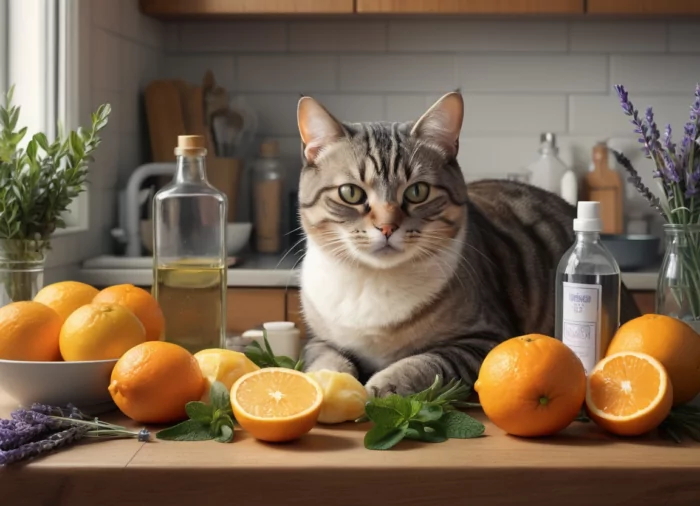
Oh, these cats! Sometimes it seems like they have their own secret list of “forbidden” smells in their heads, which they guard more than anything else. The top 5 smells that cats can’t stand are not just random aromas, but real irritants for their sensitive noses. And if you accidentally screw up and, say, spray something minty next to their bowl, be prepared for a disdainful look and a proud retreat in an unknown direction.
Sensitive nose
Cats’ sense of smell is a whole other story. They have many times more olfactory receptors than humans (somewhere around 10-15 times), so what seems like a light scent to us can be a real chemical weapon for them. That’s why some smells that we don’t even notice cause disgust or even panic in cats.
Top 5 smells that cats can’t stand:

- Citrus fruits
Lemon, orange, grapefruit – basically, everything that smells fresh to us smells like a nightmare to cats. Perhaps it’s because of the essential oils that their sense of smell perceives as aggressive. By the way, if you want to wean your cat off nibbling your favorite flowers, try wiping the leaves with orange peel. Chances of success are high! - Vinegar
For us, it’s a means of removing limescale, for a cat, it’s a reason to leave the apartment. The sharp, sour smell is too offensive to their sensitive nose, so if you suddenly need to wash something and you don’t want your furry friend to poke his nose in, vinegar will help. - Mint, lavender and rosemary. These
seem like pleasant, calming scents, right? But for cats – no! Especially mint: many people think that since catnip attracts them, they will like regular mint. But no, it rather causes disgust. - Banana It’s
strange, but true. Many cats can’t stand the smell of banana peel. Maybe because it contains some substances that remind cats of predators or something poisonous. In any case, it’s been proven – put a banana peel next to something where the cat shouldn’t go, and it won’t even go there. - Alcohol and household chemicals
Everything is logical here – sharp chemical smells are not pleasant for anyone. But for cats, this is literally an attack on the nose. Especially all kinds of alcohol vapors, acetone, ammonia. If you suddenly spilled a little beer or wine – expect a reproachful look and retreat to a safe distance.
What about food?
An interesting point: even among food, there are smells that make cats feel disgusted. For example, many furry creatures cannot stand cinnamon and cloves . Yes, spices are generally on their black list. Perhaps because they are too sharp and can irritate their sensitive nose. Although, to be honest, it is hard to imagine that anyone would ever try to treat a cat with a cinnamon bun.
Another unexpected thing is onions and garlic . They are not only unpleasant for cats, but also really toxic. Even a tiny amount can lead to problems with the blood. So if your cat suddenly takes an interest in your plate with something suspicious, it is better to make sure that there is not a gram of these products on it.
Cat’s quirks
Here’s another funny thing: some cats can be afraid not only of the smell, but also of the source of that smell. For example, if you bring something with a strong citrus aroma into the house, the cat may not just leave, but start looking at the object suspiciously, avoiding it, as if it were an alien artifact.

It can also happen the other way around – cats can literally fall in love with strange smells. For example, with shoes after a walk (ugh, of course, but for some reason they like it). Or with the smell of fresh printing ink – some cats love to poke their muzzles into books or newspapers.
Can smells be used in education?
Well, theoretically yes. If you need to discourage your cat from doing something. For example, if he sharpens his claws on the sofa or constantly climbs on the kitchen table. You can try leaving a cotton pad with a drop of citrus oil there or put an orange peel. But it is important not to overdo it – too strong smells can not only scare away, but actually spoil the cat’s mood or even cause stress.
Conclusion?
Cats are aristocrats with a picky nose. They don’t like what we find pleasant, and vice versa, they get a kick out of what we find disgusting. But, in general, this only adds to their charm. After all, what could be cuter than a cat who sniffs an orange with disdain and walks away, proudly raising his tail? 😼
Read also:
Why do cats purr
Why do cats like to wash themselves
How much do cats sleep: interesting facts about cats’ sleep